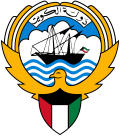 | |
Bahrain | Kuwait |
|---|---|
Bilateral relations between the Kingdom of Bahrain and the State of Kuwait began on 19 August 1971. [1] Both countries are members of the Gulf Cooperation Council and the Organisation of Islamic Cooperation.
On 5 July 2011, the media advisor to the Bahraini monarch, Nabil al-Hamir, was quoted as saying that Bahrain–Kuwait relations "have stood the test of time" and "have coalesced into a binding brotherhood between the nations". [2]
On 7 November 2014, the Kuwaiti emir, Sabah Al-Ahmad Al-Jaber Al-Sabah visited Bahrain and called upon the Bahraini monarch. They discussed ways to increase unity in the GCC and regional and global developments. [3] [4]
Sheikha Sheia bint Hassan Al Khrayyesh Al Ajmi, the second wife of the current Ruler of Bahrain Sheikh Hamad bin Isa Al Khalifa, is from Kuwait.[ citation needed ]

